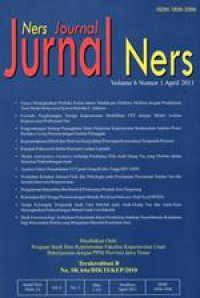
Jurnal
Factors Affecting The Compliance Of Myanmar Nurses In Performing Standard Precaution
Introduction: Exposure to pathogens is a serious issue for nurses. The literature explains that standard precaution have not consistently done in nursing. The purpose of this study was to analyze the factors affecting the compliance of nurses in Myanmar in performing standard precautions. Methods: This study used a cross-sectional design. Samples included 34 nurses in Waibagi Specialist Hospital (SHW), Myanmar. The independent variables were the characteristics of nurses, knowledge of standard precaution, and exposure to blood / body fluids and needle puncture wounds. The dependent variable was the performance of standard prevention. Data analyzed using descriptive analysis and logistic regression. Results: The result showed that almost respondents (91.18%) had a good knowledge about prevention standards and 73.5% of respondents had good adherence in performing standard precaution. However, in practice nurses have not been consistent in closing the needles that have been used correctly. The results showed that nurse characteristics did not significantly affect adherence to standard precaution with statistical test results as follows: age (p = 0.97), gender (p = 1.00), religion (p = 0.72), education (p = 0.85), work experience at SHW (p = 0, 84), education training program (p = 0.71), knowledge (p = 0.76), and needle stick injury (p = 0,17). But, there was a significant influence between adherence to standard precaution on the incidence of injury due to puncture needle with p value = 0.01. Discussion: The barriers to applying standard precautions by Myanmar nurses can be reduced by providing basic training, supervision and improvement of operational standard procedures.
Availability
No copy data
Detail Information
- Series Title
-
Jurnal Ners, Vol. 12 No. 1 April 2017
- Call Number
-
(05) 610.5 PRO j
- Publisher
- Surabaya : Prodi Ilmu Keperawatan FK Unair., 2017
- Collation
-
Hlm. 1-8
- Language
-
English
- ISBN/ISSN
-
1858-3598
- Classification
-
(05) 610.5 PRO j
- Content Type
-
-
- Media Type
-
-
- Carrier Type
-
-
- Edition
-
Vol. 12 No. 1
- Subject(s)
- Specific Detail Info
-
-
- Statement of Responsibility
-
-
Other version/related
No other version available
File Attachment
Comments
You must be logged in to post a comment
 Computer Science, Information & General Works
Computer Science, Information & General Works  Philosophy & Psychology
Philosophy & Psychology  Religion
Religion  Social Sciences
Social Sciences  Language
Language  Pure Science
Pure Science  Applied Sciences
Applied Sciences  Art & Recreation
Art & Recreation  Literature
Literature  History & Geography
History & Geography